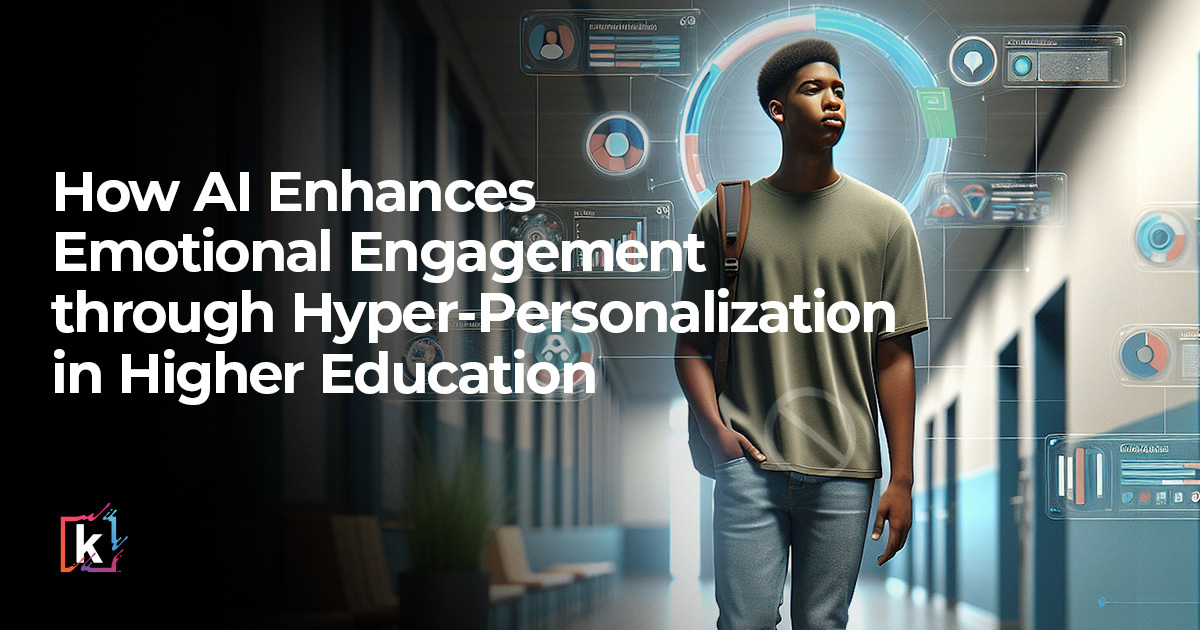How AI Enhances Emotional Engagement through Hyper-Personalization in Higher Education


As technology continues to advance and attention spans decrease, higher education institutions face the challenge of making meaningful connections with prospective and current students in less time. That’s when hyper-personalization, a strategy that leverages data to foster emotional connections by tailoring experiences to individual needs, becomes necessary. Emotional connection is vital because it increases recall, which in turn increases conversion rates and student amplification.
The Power of Emotional Engagement in Higher Education
Emotional engagement in higher education refers to the connection students feel towards their institution. When students are emotionally invested, they are more likely to enroll, stay enrolled, and succeed academically. According to the Journal of Student Affairs, institutions that engage students emotionally create more supportive and connected environments, leading to improved academic performance, higher student satisfaction scores, and increased retention rates.
Hyper-Personalization with AI: Tailoring the Student Experience
Hyper-personalization uses AI to create deeply individualized experiences for students by analyzing behavioral, demographic, and academic data. The data is activated to display dynamic, responsive content, such as headers that change based on a student's recent online activity, current major, or completed credits, fostering a sense of belonging. Personalized notifications, financial aid reminders or departmental project deadlines sent directly to students' phones, further reinforce this trust while demonstrating the school’s commitment to the student’s success.
Automated, personalized event invitations allow institutions to celebrate students’ progress while providing opportunities for further customization along their academic journey. These thoughtful gestures enhance emotional connections that help students feel supported every step of the way. Small, personal touches create a sense of attention and care, helping students feel connected to the institution's community.
AI-Driven Enrollment Messaging: Reaching Prospective Students
Personalized messaging is crucial in the enrollment process. AI can create tailored emails, ads, and notifications based on prospective students' behaviors and interests. For instance, a student interested in exploring engineering or business programs can receive content directly aligned with their academic aspirations and goals. This type of personalized communication helps prospective students feel that the institution understands their unique needs.
Institutions like North Carolina Agricultural and Technical State University are already excelling in this area. By integrating AI into their website, they’ve created an interactive experience that allows users to access personalized content tailored to their interests without navigating complex menus. This approach not only captures prospective students’ attention but also strengthens emotional engagement by offering a more personalized and streamlined experience that speaks directly to each student's unique needs and preferences.
Real-Time Support Services and AI-Driven Interventions
AI can also be pivotal in providing real-time, personalized support for current students. By tracking interactions and predicting when students may need help, AI systems can automatically recommend resources like tutoring, counseling, or career services. Timely intervention helps higher education institutions create a supportive environment that improves student success, reduces dropout rates, and enhances overall satisfaction.
While AI offers powerful personalization capabilities, it is important to remember that it is a tool, not a holistic solution. AI should be integrated into a higher education institution's marketing and communications program with careful oversight to ensure that all generated content aligns with the institution's brand voice, values, and goals. Striking a balance between AI’s advantages and maintaining authenticity is key to fostering trust and consistency of voice.
Ethical Considerations and Data Privacy
As AI becomes more integrated into higher education, the regulation of behavioral data will increase. Institutions will need to navigate new privacy regulations that may limit the types of data available for analysis. It is crucial that institutions respect student privacy when using AI to create personalized experiences. AI systems must also be designed with failsafe to avoid reinforcing biases, ensuring that all students are treated fairly and inclusively.
The Future of AI in Higher Education
AI will continue to shape the future of higher education. Emerging technologies like virtual reality classrooms and digital twins are paving the way for professors to implement even more personalized learning experiences. These tools enable real-time adaption to students’ needs, supporting both academic success and emotional well-being.
AI's role in enhancing emotional engagement through hyper-personalization is transforming higher education. By tailoring experiences to meet the unique needs of prospective and current students, AI fosters deeper emotional connections, increasing retention and student satisfaction. As AI tools continue to evolve, higher education institutions will be better equipped to create personalized, supportive environments that improve the student experience and drive institutional success.

